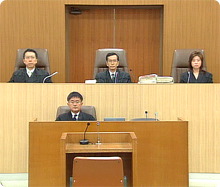|
|
|
Japan Court Orders To Compensate 'War Orphans'
International |
2006/12/01 16:41
|
| A Japanese court on Friday ordered the government of Japan to pay 468 million yen to 61 Japanese plaintiffs who were displaced as children in China after World War II. The plaintiffs - known as "war orphans" - alleged that the government failed to promptly remove them from China after the war, causing them to face hardship as foreigners in China. They also claim that they endured difficulty acclimating to Japanese culture when they were repatriated in the 1970s. According to the lawsuit, the government failed to assist the repatriation process although many of the plaintiffs did not speak Japanese or were shunned by living relatives. In the 1930s, the government transported 320,000 settlers to the Manchuria province to establish a base of operations for Japan's 1937 invasion of China. Many Japanese settlers were left behind after the war, however, and many children were raised by Chinese citizens. The plaintiffs remained displaced until 1975 when the government began locating them. In 1994, the Japanese government passed legislation providing financial assistance to Japanese nationals who returned to Japan. Last year, an Osaka court rejected similar claims from a different group of plaintiffs, declaring that the government had no obligation to provide compensation. |
|
|
|
|
|
|
Class action or a representative action is a form of lawsuit in which a large group of people collectively bring a claim to court and/or in which a class of defendants is being sued. This form of collective lawsuit originated in the United States and is still predominantly a U.S. phenomenon, at least the U.S. variant of it. In the United States federal courts, class actions are governed by Federal Rules of Civil Procedure Rule. Since 1938, many states have adopted rules similar to the FRCP. However, some states like California have civil procedure systems which deviate significantly from the federal rules; the California Codes provide for four separate types of class actions. As a result, there are two separate treatises devoted solely to the complex topic of California class actions. Some states, such as Virginia, do not provide for any class actions, while others, such as New York, limit the types of claims that may be brought as class actions. They can construct your law firm a brand new website and help you redesign your existing law firm site to secure your place in the internet. |
Law Firm Directory
|
|





